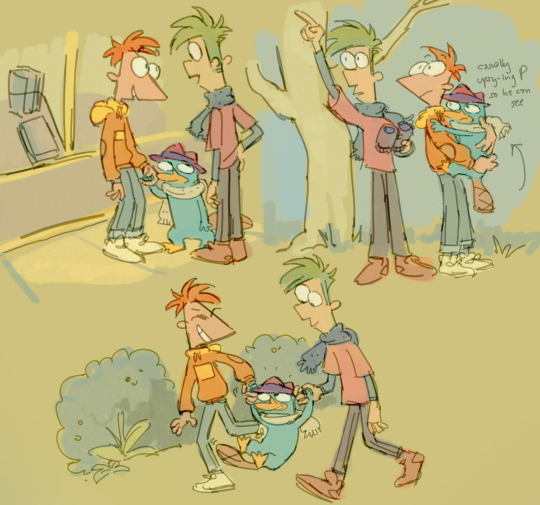#right of exit
Explore tagged Tumblr posts
Text




Yeah, Kris is definitely NOT alright.
FIRST - PREVIOUS - NEXT
MASTERPOST (for the full series / FAQ / reference sheets)
#undertale#deltarune#utdr#crossover#crossover comic#undertale fanart#deltarune fanart#twin runes#twin runes comic#twin runes au#kris dreemurr#frisk#and we arrived at the breaking point#i know the last pages have been very depresso but i swear once this arc is over we'll get right back on track with the funnies#but first we have to deal with some DRAMA#imagine what it would be like if some otherworldly entity took over your body#and suddenly you start making friends and patching up old friendships#Something even your mother is proud of you for#even though it's not YOU doing that#you'd feel like people don't like YOU but only that parasite in your body#because without it you're just that creepy kid next door#you'd feel like the world would be better without you#at least that's what Kris must be feeling right now#i DO wonder what's up with this cave though#it clearly is NOT the exit#and what's with those markings outside and inside the cave?#hmmmmm
4K notes
·
View notes
Text
Murderbot September day 3: (Alternative prompt) “I don’t like you.” / “I know.”

#mbs24#the murderbot diaries#murderbot#gurathin#I always liked this bit in the book! I hope I got MB’s ‘loading…’ right hehe#might do a part 2#exit strategy spoilers#tmbd spoilers#tmbd#my art#Fanart
2K notes
·
View notes
Text

their category defying rship wtih perry
#it takes on a lot of new dimensions over time but. at the end of the day they raised him and exited childhood alongside him#they have the exclusive right to baby him#draws#phineas and ferb
988 notes
·
View notes
Text
i love when wilson pops into an episode only to psychoanalyze house to the point of endangering both of them and then fucks off.
#look cute and read boyfriend to rubble and make a swift stage right exit#james wilson#hilson#house md#house md rewatch#job well done
3K notes
·
View notes
Text

literally how did she get out of that
#bfdi#battle for dream island#evil leafy#bfdi evil leafy#osc#bfdia#book#bfdi book#EL HAD HER RIGHT THERE??? HOW DID SHE GET OUT ???? WHAT#fanart#LIKE LITERALLY#right in the corner. el blocking the only exit. trying to grab a loose piece of wood off the wall for some reason#no cuz i literally saw her grab that nd was like#Are they gonna fight#imag8ne if we got a fight between book and evil leafy. how awesome would that be for someone to actually like#defend themselves against her WOULDNT THAT BE SO AWESOME GUYS COME ONNNNN COME ON WHY DID THEY JUST HAVE IT OFFSCREEN#WE DONT EVEN KNOW WHAT HAPPENED AND IT MAKES NO. SENSE HOWD SHEok ok ok#been a while since i went insane in tags i think. and its about the shipwreck scene again god damn it#but it has nothing on that other post
551 notes
·
View notes
Text

#trump#donald trump#trump 2024#he must be doing something right!#current events#they keep trying to kill him and he keeps surviving#god bless#trump assassination attempt#trump assassination attempt number 2#golf course#news#america#world events#us elections#election 2024#american politics#God bless Donald Trump#fight#MAGA#Protect Trump#murder has no place in politics#so leftists may need to exit politics stage left if they're going to keep trying to kill people because they don't agree with them LOL#murdering someone because you don't agree with them is wrong#DUH
952 notes
·
View notes
Text






♪ Worldwide - Big Time Rush
I'm gonna be honest- these episodes kind of fell apart while I was making this. The more I re-wrote the story for it's second draft the less this version made sense and the less interested I was to work on it. I have not much else to say except sorry this part is kinda iffy and sorry it took so long. I promise you I'll make up for this in the next episode I PROMISE
Notes on both episodes under the cut!
Sweden Sour
* (I think it’d be really funny if Cody just doesn’t talk at all this episode. Not a word. Just nods and head shakes and depressed faces.)
* Cody’s incredibly depressed after Noah’s elimination. Sierra’s over the moon, though. She sees Cody depressed and gives him a tight side hug, petting his head. She tries consoling him with “I know you’re sad, but it’s ok! At least I’m still here~.” Cody starts sobbing, head in hands. Heather is sick of this already.
* The teams get their “ibuilda” pieces and the Amazons argue on what it’s supposed to be. Cody stares at the pieces for a few seconds before the light briefly re enters his eyes. He starts building. Courtney tells him to stop but Heather tells her he’s obviously got it, so let him work. They start helping him build… something.
* Once the Amazons are done, Heather, Sierra and Courtney take a step back to see what they’ve built. It’s a giant wooden Noah head. Their faces drop. Heather is filled with murderous rage.
* We built Noah’s face (We’re gonna take first place) Cause we built Noah’s faaaace
* Tyler’s jumper would be white.
* Cody doesn’t sing in this number. Chris notices and stares at him threateningly. He reluctantly hums the chorus and Chris takes what he can get.
* (Alejandro takes off his shirt to pull the boat like a freak. Duncan is unfazed and Tyler will deny it if you ask him if he blushed.)
* Sierra hits Noah’s Head hard enough it falls over on its side and suggests sawing off the side to ride in him like a boat. Heather and Courtney agree to this. Cody has no comment.
* Duncan and Alejandro don't bother bending over backwards to please Tyler. Duncan makes himself captain and no one argues.
* When the Amazons go to pick a captain, Courtney grabs the hat and declares herself captain without input. Heather tries to argue but Courtney argues back- Cody is in no condition, no one trusts Sierra and Heather took control the last challenge so this time she’s in charge. Heather reluctantly backs down.
* Amazons catch up to team Chris in the water. Alejandro sees them approach and makes note of Cody’s face, making fun of him for being so upset about “the Noah thing”. Cody furrows his eyebrows and points furiously at Chris’s boat. Courtney agrees that yes, they should shoot their boat.
* It doesn’t matter who wins the challenge since it’s a non elimination round, but I want to say the Amazons persevere. The massage helps Cody enough that he’s not stone faced next episode at least.
Aftermath III (Aftermath Aftermayhem)
* Gwen, Owen and Noah are introduced together. Gwen walks out first and Owen, hugging Noah to the point of lifting him off the ground, walks behind her.
* Geoff asks what all that’s about and Gwen responds that Owen refused to let him go until Noah “understood just how sorry he was”. Noah insists he forgives him, but Owen still won’t let him go.
* The Owen square is replaced by the Tyler square. The prompt is survive. (The hosts throw a bunch of debris at the contestant for thirty seconds and if they dodge everything they move on.)
* (For brevity’s sake, assume all of the contestants that participated in the board game in the original episode participated here [with the exception of Tyler, who is replaced with Owen]. They all get eliminated the same way as well, Noah getting got by aliens, Owen falling down the booby trap square and Beth making it to the final question.)
* When Beth gets stumped on the last question (What was Duncan's band called) Noah yells at her, frustrated: “Oh my- It’s Der Schnitzel Kickers, Beth!!” Confetti and balloons fall from the ceiling.
* (He knows this because Cody had mentioned it in a conversation after the London challenge.)
* Noah initially complains about winning the game, but Owen reminds him that he gets to see Cody again and he shuts up immediately.
* “Noah wins!” “Wasn’t he disquali-” “NOAH WINS!! Let’s wrap it up. We’re done here.”
#world tour but noco are the only ones kissing#wtbnatook : main#total drama#total drama world tour#tdwt#total drama noah#td noah#total drama cody#td cody#cody anderson#noco#total drama noco#td noco#I am aware eliminating Noah just to bring him back after an episode is cheap i know. believe me this gets rectified in the second draft#for now I need you to go with the flow#ESPECIALLY cause the next episode makes this worth it#do you think they've been thinking about eachother worldwide (yes they have)#They're never as far away as it may seem (no)#soon they'll be together- they'll pick up right where they left off!#for real though the next episode is stacked as hell#im so exited to be moving on from these two and get into my favorite episode of the rewrite
421 notes
·
View notes
Text
Feel free to reblog and talk in the tags about the first time you played!
#technically i played in late 2015#but i just loaded it and then exited right back out#didn't play for another year after that#undertale#deltarune
3K notes
·
View notes
Text





my reaction to sonic 3 post credit scene but as shadow because I had my very cool shadow hoodie on lol
#sonic 3#sonic 3 spoilers#spoiler#shadow the hedgehog#now ill be the one littering places with spoilers for everyone else#ill remember to try and tag them though#NOBODY commented or reacted on my shadow hoodie >:( at least not within my ear- or eye-shot#maybe one kid trying to pick everyones attention about it but i couldnt hear him well#kept trying to make myself as visible as possible. smiling friendly and showing my bootleg sonic plushie i also brought and all#no avail#so since nobody was to match my freak i decided to do it all myself and go full out#my family isnt the type to stay on credits you see :( so when the scene started i decided to stay in place right before exit and watch#Forgive Me Or Not Father But I Shall See My Next Character Teaser Whether You Want or Not#also given shadow got the same ending as in adventure 2#it mustve been very fucking funny actually#to see a girl cosplaying as him tripping on stairs and almost falling#Helios Cinema we are seeing each other again in my full sonic freak mode in 2027#or whenever they announced the movie on#long post
219 notes
·
View notes
Text

Sneaking out of the office early on a Friday like…
Deep-sea giant isopods use their 14 legs to tiptoe along the seafloor. When the need to move a little more quickly arises, they fan out their uropod and pleopods (their tail and swimming limbs) and paddle away. Either way, they’re getting a jumpstart on the weekend.
#monterey bay aquarium#if i walk very slowly they wont notice#im about to roly poly right outta here#taking my exoskeleton to the exit
2K notes
·
View notes
Note
asking here when it comes to deciding was exactly what soundwave will be; if he was a harpy would you go with the pjo disign for him or the tradishonal version from mytholigy; and if you chose a siren would you go ithe the ones in the sea or the bird ladys that actuly sing the songs that loer in sailers? exuce my bad spell in i was rushing
I cannot even tell you the number of times I’ve tried responding to this ask,, tumblr keeps forgetting my drafts and it’s killing me to death,, 😭💀✨

SoOo, I may be a liiitle indecisive, how about we squish a couple of concepts together why don’t we? 👏✨
Fundamentally,, I consider Soundwave to be a bird siren with just, a couple more feathers, XD,, like if I saw him chilling on a rock, my initial reaction would be “LOOK AT THAT BIRD!?” as opposed to “LOOK AT THAT FISH!?” 🫵🤨

Background wise Soundwave likes to chill next to the water because it’s easier to blame strange trills and noises on ocean echos or waves to passerby’s, then it is to get the kingdom guard off his back if they had found out about his abilities 📻🥷
I’ve never considered Soundwave to be a knight as he was created long after the initial knights fall, and only gained his Siren-like abilities due to a pledge he vowed to simply the belief of their existence,, [mostly to protect his cassettes <33] He unintentionally lost his sight to Primus in exchange for these cybernetic abilities because of this vow, u-u✨

Speaking of “Cybernetic Advancements” 👏òuo,, Soundwaves siren abilities are [mostly] used in self defense so what’ll happen [more often than not,, *evil snicker*] is that he’ll wait for his subject to wander into his territory, and create a frequency that matches their EM field rate and make subtle shifts that the target feels and reacts to,,
Making them stressed / anxious,, meaning that if they don’t leave immediately, then they’re usually just scared enough to run away screaming if he pops out at them 😤✨


And, why the tfp Soundwave design? 👀?
UHhm,, aesthetics?? Just look at him! Those big metal bits on the tfp design are literally begging to be some funky wings and feathers 👏😂
#tf cursed knights au#transformers#tfp soundwave#tfp laserbeak [if you squint hard enough >;] ✨]#I was so exited to get this ask#you’ve got no idea 😭#I was right in the middle of these wips and got the notif-#my immediate reaction was -#*Megatron esc laughter* yeES#with the eyes going in two different directions and everything TuŤ#let’s hope to PRIMUS that this post does not delete itself again 😭#🤞⚔️✨
107 notes
·
View notes
Text
DNP saying thank you & goodbye to the meet & greet people, Berlin 08.09.24
#hskfkdhsjskkdfkkendkwks i didn't expect him to just appear right in front of me#everyone was standing up to go ahead into the theater and then suddenly a wild dan appeared#never knew my camera reflexes were that good#dan and Phil#dnptit#terrible influence tour#terrible influence spoilers#gonna tag it as spoiler just in case#tit spoiler#dnp spoiler#terrible influence tour spoiler#tit tour#my video#btw for anyone concerned about space issues that's the door that the meet & greet people exited from into the main foyer#where they made us wait before we could go into the actual theater (on the other side)#we were crowding ourselves not dnp 😂
183 notes
·
View notes
Text

you either serve or you die
#sharking draws#one piece#donquixote family#donquixote doflamingo#sugar one piece#dellinger one piece#dellinger#baby 5#baby 5 one piece#bellamy one piece#dressrosa#we will simply pretend trebol doesnt exits#sugar was so right when she told trebol to die i fucking hate trebol
55 notes
·
View notes
Text
It really does look like pivoting to Harris has thrown the Republican party for a loop. She's speaking clearly, concisely, and with wit; if she were to be put in the ring with Trump, it would be a knockout if only because she's coherent.
I'm voting blue regardless, but I've started to feel like I've moved from voting for the 'least bad' option to someone I might actually be more passionate in supporting.
#US politics#biden harris 2024#Also before people comment or reply or etc#I will NOT be posting more on this matter#I keep politics off this blog because there's already plenty of it out there#also I know that Harris isn't perfect. the media has made it abundantly clear and thrown all of her failures to the public#dems have ALSO criticized some of her work/legislation#but again (and I cannot stress this enough)#WE CANNOT DEMAND PERFECTION RIGHT NOW#I'd argue that a good percentage of Americans (~40-50%) do not have a solid grasp of how absolutely precarious things are right now#and I'm not talking about the economy or the job market or housing#I am talking about looking at the historical precedent for everything the right is trying to do#the water is heating up. They're setting it to boil. If you are not careful#you'll find your rights are slowly starting to slip through your fingers#“Oh Artsekey that's catastrophic thinking! You're making it sound worse than it is!”#Listen. Our nation is extremely young. We're exiting decades of prosperity. People are desperate. They want something to grasp on to#These are the conditions in which people accept more authoritarian rule. Slowly. A little at a time.#It. Can. Happen. Here. Don't let it!
183 notes
·
View notes
Text

i finished it, was kicked out of the game, and then spent the next 10 minutes drawing this. i will now go take a shower, most likely cry, and then go through the emotional turmoil of convincing myself to reset so i can do a geno run. i hate it here :D
#undertale yellow#uty#my art#<- ifg#spoilers under these tags beware. although it is mostly just me being very very sad#that entire thing was heart wrenching. anyways#CEROBAS FIGHT??? HELLO???#i had to exit out of it the first time (i got to the last phase) to get better items but i came back and won pretty quickly#but THE CUTSCENES?!?!?#JFC NO WONDER THIS WOMANS SO MESSED UP. HER HUSBAND PRACTICALLY DIED IN HER ARMS AND THE LAST THING HE LEFT HER WITH- HIS DYING WISH- COULD#ONLY BE FULFILLED BY PUTTING THEIR ONLY CHILD IN DEATHS WAY. AND THEN WHEN SHE TOOK THAT RISK THE WORST THING HAPPENED AND SHE NOW HAS TO#LIVE WITH THE GUILT OF BEING THE ONE TO. MOST LIKELY. KILL HER ONE AND ONLY DAUGHTER#ALL THE WHILE SHE WAS PUSHING AWAY HER CHILDHOOD BEST FRIEND AND CONVINCING HERSELF THAT SHE WAS IN THE RIGHT TO SACRIFICE CLOVER WHO HAD#BEEN ONLY KIND MERCIFUL AND JUST THIS WHOLE TIME. EVEN TO THOSE WHO WERE TRYING TO KILL THEM. FUCK.#AAND WHEN CLOVER HUGGED HER I DOUBLED OVER IRL BC *THATS EXACTLY WHAT I WANTED TO DO IN THAT MOMENT* I HATE IT (read: love it) HERE#n dont even get me STARTED on after that. when clover started moving on their own and the gd white screen came up and we got flashbacks of#everyone's words. thats when the tears rlly started coming bc it clicked for me. 'oh. this is it. isn't it?' and IT WAS#WHEN THEY GAVE THEIR FUCKIGN HAT AND GUN AWAY TO MARTLET AND STARLO WELL THATS WHEN I REALLY STARTED CRYING#AAND THE GROUP HUGG#I WAS SOBBING WHENEVER I HAD TO WATCH THEM CRAWL UP AGAINST THE WALL AND DIE AND HAVE FLOWEYS WORDS PLAY OVERHEAD#AND THE FUCKOGN#THE F U C K I N G#AFTEWRCREDITS SCENE WHERE WE GOT THE 'You heard someone calling for help. You answered.' I GOT CHILLS SO BAD#to think that all the other souls have stories just as expansive and emotional as clover n frisks. how fucked up is that. in a good way tho#and finally the last scene where we got all 4 of our main friends sending us off in waterfall and we see clovers items end up in the dump#just waiting to be found by bratty and catty. fucken hell man this was a masterpiece#anyways time to reset and obliterate everyone and never emotionally recover from that ever!! really is feeling like 2016-17 again w the way#this game has me sobbing my eyes out and feeling the guilt of knowing that i dont HAVE to kill them all but im too curious not to#oh well. at least i have the balls to do it this time around instead of letting a youtuber do it for me ig
739 notes
·
View notes
Text

as Garreth once said: “sometimes I worry that you’re all a part of some exclusive cult.” (he’s not wrong)
next gen keepers you’ll always be famous to me 🧎🏻♀️
#this didn’t come out the way I wanted so I’m frustrated but…you guys see the vision right 😭😭#another victim of accidentally exiting the camera in otis so I couldn’t take more shots 💀#found family trope goes hard when you’re all traumatized orphans#hogwarts legacy#hogwarts legacy mc#my screenshots
76 notes
·
View notes